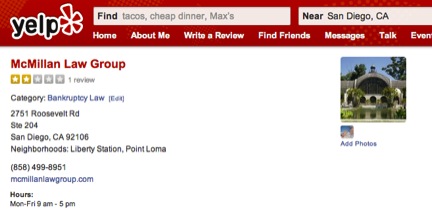
But unlike restaurants, hair salons, and other stores, your law firm has a more difficult time getting reviews. Because legal matters are often private or embarrassing, many clients do not feel spontaneously inclined to share their experiences with the whole of the Internet.
We get it. That being said—we beg, we implore, we urge you: Don’t write or buy fake reviews. Ever.
There are a number of companies out there that will write fake reviews for you. Some of these reviews may even make it past Google and Yelp’s strict review filters, algorithms specifically designed to spot and eliminate fake reviews from profiles.
But despite any temporary gains your online presence may get from fake online reviews, they are a truly terrible idea.
First, they’re unethical, deceptive, and just…slimy. Enough said.
In addition, they are eroding faith in all online reviews. Right now, consumers trust online reviews just as much as recommendations from people they trust. Unfortunately, as more and more companies purchase fake reviews from unscrupulous review businesses, consumers increasingly lose this trust. This could someday mean that potential clients won’t trust your good reviews, even if they are one hundred percent real.
Finally, fake reviews can result in serious legal and financial penalties.
The New York Times recently reported that the state of New York is cracking down on deceptive reviews following an intensive investigation into companies that create fake reviews and those that buy them.
The New York attorney general said of the investigation, “What we’ve found is even worse than old-fashioned false advertising. When you look at a billboard, you can tell it’s a paid advertisement – but on Yelp or CitySearch, you assume you’re reading authentic consumer opinions, making this practice more deceiving.”
As a result of the investigation, nineteen companies have agreed to stop this misleading practice and pay $350,000 total in penalties.
The review site Yelp is also cracking down on fake reviews. The company is suing a San Diego, California law firm for posting fake reviews on its Yelp profile. The suit, which cites “breach of contract, intentional interference with contract, and false advertising,” is asking for $25,000.
So, if not by purchasing fake reviews, how do you get good reviews?
It starts with good service.
If your clients are satisfied with the service you provided them, you can bet that—more often than not—they will be more than happy to leave you a review. Just ask! Write them a thank you for working with your firm and ask them to leave you a review on your Google+ Local and Yelp profiles. It takes time to get real, positive reviews, but we can tell you it’s worth the effort.

Reviews are great for business everyone knows that. It was standard practice a few years ago to slap a couple of testimonials on a shiny new website that was short on content – and that is where the problem began.
If something brings good results such as reviews then there will always be people trying to cut corners and ‘game’ the system – They spoil it for the rest of us! In this case ‘IT’ is the internet.
A few years ago articles appearing on Blog sites was the hot thing that built seo and brought traffic. Now it is the ‘fake’ review that boosts business.
As Google closed down the article spinning sites they will close down the ‘fake’ and ‘gamed’ review sites, and as with the Panda update they will take down the companies who use them.
We are seeing more articles like this one, and more stories not only online but increasingly in the main stream press about the damage done by fake reviews.
Google, Bing and Yahoo have a vested interest in keeping the internet free of lies and fraud, they need it to be a properly functioning market, a place safe for us to go. If they can’t do that we will choose to use a search engine that can.
Simply put, faking and filtering reviews is ‘black hat seo’ and it will not continue for long.
Don’t even think about it!